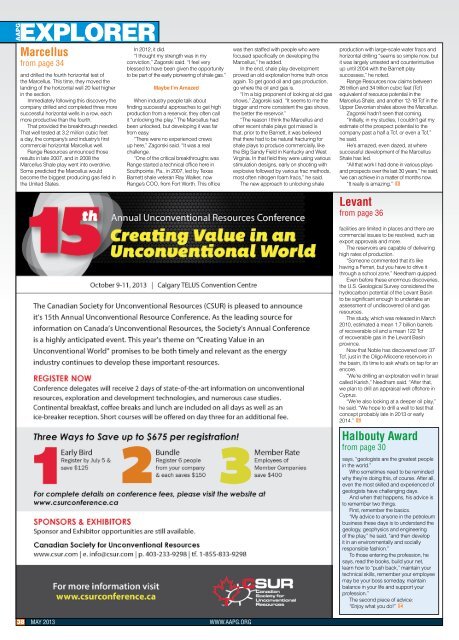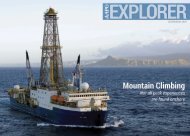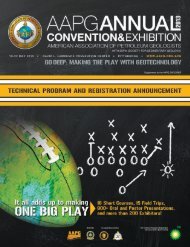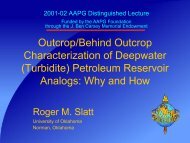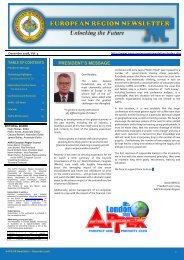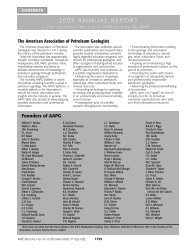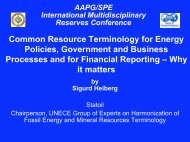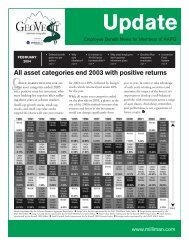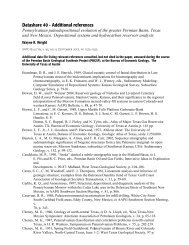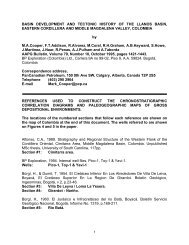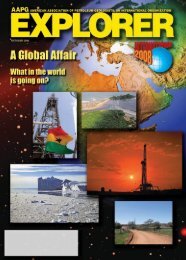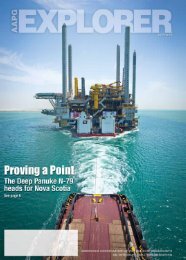Download - American Association of Petroleum Geologists
Download - American Association of Petroleum Geologists
Download - American Association of Petroleum Geologists
Create successful ePaper yourself
Turn your PDF publications into a flip-book with our unique Google optimized e-Paper software.
AAPG<br />
EXPLORER<br />
Marcellus<br />
from page 34<br />
and drilled the fourth horizontal test <strong>of</strong><br />
the Marcellus. This time, they moved the<br />
landing <strong>of</strong> the horizontal well 20 feet higher<br />
in the section.<br />
Immediately following this discovery the<br />
company drilled and completed three more<br />
successful horizontal wells in a row, each<br />
more productive than the fourth.<br />
That provided the breakthrough needed.<br />
That well tested at 3.2 million cubic feet<br />
a day, the company’s and industry’s first<br />
commercial horizontal Marcellus well.<br />
Range Resources announced those<br />
results in late 2007, and in 2008 the<br />
Marcellus Shale play went into overdrive.<br />
Some predicted the Marcellus would<br />
become the biggest producing gas field in<br />
the United States.<br />
In 2012, it did.<br />
“I thought my strength was in my<br />
conviction,” Zagorski said. “I feel very<br />
blessed to have been given the opportunity<br />
to be part <strong>of</strong> the early pioneering <strong>of</strong> shale gas.”<br />
Maybe I’m Amazed<br />
When industry people talk about<br />
finding successful approaches to get high<br />
production from a reservoir, they <strong>of</strong>ten call<br />
it “unlocking the play.” The Marcellus had<br />
been unlocked, but developing it was far<br />
from easy.<br />
“There were no experienced crews<br />
up here,” Zagorski said. “It was a real<br />
challenge.<br />
“One <strong>of</strong> the critical breakthroughs was<br />
Range started a technical <strong>of</strong>fice here in<br />
Southpointe, Pa., in 2007, led by Texas<br />
Barnett shale veteran Ray Walker, now<br />
Range’s COO, from Fort Worth. This <strong>of</strong>fice<br />
was then staffed with people who were<br />
focused specifically on developing the<br />
Marcellus,” he added.<br />
In the end, shale play development<br />
proved an old exploration home truth once<br />
again. To get good oil and gas production,<br />
go where the oil and gas is.<br />
“I’m a big proponent <strong>of</strong> looking at old gas<br />
shows,” Zagorski said. “It seems to me the<br />
bigger and more consistent the gas shows,<br />
the better the reservoir.”<br />
“The reason I think the Marcellus and<br />
other recent shale plays got missed is<br />
that, prior to the Barnett, it was believed<br />
that there had to be natural fracturing for<br />
shale plays to produce commercially, like<br />
the Big Sandy Field in Kentucky and West<br />
Virginia. In that field they were using various<br />
stimulation designs, early on shooting with<br />
explosive followed by various frac methods,<br />
most <strong>of</strong>ten nitrogen foam fracs,” he said.<br />
The new approach to unlocking shale<br />
production with large-scale water fracs and<br />
horizontal drilling “seems so simple now, but<br />
it was largely untested and counterintuitive<br />
up until 2004 with the Barnett play<br />
successes,” he noted.<br />
Range Resources now claims between<br />
26 trillion and 34 trillion cubic feet (Tcf)<br />
equivalent <strong>of</strong> resource potential in the<br />
Marcellus Shale, and another 12-18 Tcf in the<br />
Upper Devonian shales above the Marcellus.<br />
Zagorski hadn’t seen that coming.<br />
“Initially, in my studies, I couldn’t get my<br />
estimate <strong>of</strong> the prospect potential to the<br />
company past a half a Tcf, or even a Tcf,”<br />
he said.<br />
He’s amazed, even dazed, at where<br />
successful development <strong>of</strong> the Marcellus<br />
Shale has led.<br />
“All that work I had done in various plays<br />
and prospects over the last 30 years,” he said,<br />
“we can achieve in a matter <strong>of</strong> months now.<br />
“It really is amazing.”<br />
Levant<br />
from page 36<br />
facilities are limited in places and there are<br />
commercial issues to be resolved, such as<br />
export approvals and more.<br />
The reservoirs are capable <strong>of</strong> delivering<br />
high rates <strong>of</strong> production.<br />
“Someone commented that it’s like<br />
having a Ferrari, but you have to drive it<br />
through a school zone,” Needham quipped.<br />
Even before these enormous discoveries,<br />
the U.S. Geological Survey considered the<br />
hydrocarbon potential <strong>of</strong> the Levant Basin<br />
to be significant enough to undertake an<br />
assessment <strong>of</strong> undiscovered oil and gas<br />
resources.<br />
The study, which was released in March<br />
2010, estimated a mean 1.7 billion barrels<br />
<strong>of</strong> recoverable oil and a mean 122 Tcf<br />
<strong>of</strong> recoverable gas in the Levant Basin<br />
province.<br />
Now that Noble has discovered over 37<br />
Tcf, just in the Oligo-Miocene reservoirs in<br />
the basin, it’s time to ask what’s on tap for an<br />
encore.<br />
“We’re drilling an exploration well in Israel<br />
called Karish,” Needham said. “After that,<br />
we plan to drill an appraisal well <strong>of</strong>fshore in<br />
Cyprus.<br />
“We’re also looking at a deeper oil play,”<br />
he said. “We hope to drill a well to test that<br />
concept probably late in 2013 or early<br />
2014.”<br />
EXPLORER<br />
Halbouty Award<br />
from page 30<br />
says, “geologists are the greatest people<br />
in the world.”<br />
Who sometimes need to be reminded<br />
why they’re doing this, <strong>of</strong> course. After all,<br />
even the most skilled and experienced <strong>of</strong><br />
geologists have challenging days.<br />
And when that happens, his advice is<br />
to remember two things.<br />
First, remember the basics.<br />
“My advice to anyone in the petroleum<br />
business these days is to understand the<br />
geology, geophysics and engineering<br />
<strong>of</strong> the play,” he said, “and then develop<br />
it in an environmentally and socially<br />
responsible fashion.”<br />
To those entering the pr<strong>of</strong>ession, he<br />
says, read the books, build your net,<br />
learn how to “push back,” maintain your<br />
technical skills, remember your employee<br />
may be your boss someday, maintain<br />
balance in your life and support your<br />
pr<strong>of</strong>ession.”<br />
The second piece <strong>of</strong> advice:<br />
“Enjoy what you do!”<br />
EXPLORER<br />
EXPLORER<br />
38 MAY 2013 WWW.AAPG.ORG


